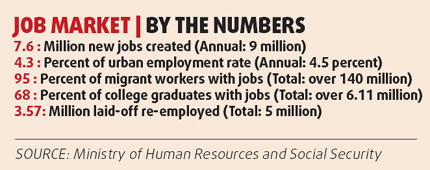
|
CHINA> National
 |
|
Related
New jobs work out for 7.6m, unrest ruled out
By Cui Xiaohuo (China Daily)
Updated: 2009-09-10 07:19 Job creation momentum has let the nation's minister of human resources and social security to believe that social unrest triggered by unemployment could be a thing of the past.
"I am convinced the current measures taken by the central government will prevent further social unrest from happening," Yin Weimin told China Daily on the sidelines of a press conference at the State Council Information Office. China has not seen any social unrest so far this year - protests, riots or demonstrations - triggered by unemployment. The minister said Wednesday that the country created 7.57 million new jobs in 2009, some 84 percent of its annual goal. And he added that the registered unemployment rate in urban areas stood at 4.3 percent and had been stable for some time.
"Updated statistics have shown the employment situation is generally stable," the minister said. "The worst-case scenario we prepared for earlier, in which migrant workers who lost their jobs might turn up protesting, did not take place. "And college graduates are also quite stable, with sufficient employment measures in place," the minister told China Daily. Government data shows that 95 percent of migrant workers had jobs last month, which was on par with the percentage working last year. And a recent shortage of labor in the Yangtze River Delta and Pearl River Delta areas, both economic heartlands, underlines the recovery of the economy and the creation of new jobs, the official said. "This is a significant signal underlining a U-turn in China's economy," said Chen Yu, director of the China Institute for Occupation Research at Peking University. But Yin pointed out that the overall employment situation remained "severe".
 More than 30 percent of China's 6.11 million fresh college graduates were unemployed as of July and China had more than seven million young unemployed people seeking work. About 30 percent of China's five million recently laid-off workers remained jobless in August. Yin said the central government would invest more money to ensure additional people find work. "Though the employment situation is brightening, the authorities should open more channels to let migrant workers know about new jobs in the coming months," said Liu Junsheng, a Beijing-based labor researcher and government advisor. Experts welcomed the fact that the central government was placing so much emphasis on creating employment. "Given the current measures, unemployment will be, perhaps, the last reason for social unrest in China," said Chen, from the China Institute for Occupation Research. Because any widening of the gap in affluence between rural and urban areas could lead to social problems, the authorities have pledged more efforts to close that gap. Hu Xiaoyi, vice-minister of the human resources ministry, Wednesday said that the government was trying to improve China's social security system. He said a rural pension program and a new cooperative medicare system were among initiatives aimed at narrowing the urban-rural gap. The pilot rural pension program, launched in August, offers farmers older than 60 in rural areas a monthly endowment. The central government wants to roll the program out to 10 percent of counties this year and make it universal by 2020. Minister Yin said the central government "stands firm" on its commitment to bridge the income gap between rich and poor and has plans to put a ceiling on the skyrocketing salaries of executives with State-owned enterprises. The new document will call for executives' pay hikes to be in line with workers' increases, and the relevant union will have a say on bosses' pay, the minister told China Daily. "The central government is clear that the incomes of the masses must grow, in line with the growing economy," he said. Last week, the cabinet issued a new set of guidelines urging government-funded hospitals, schools and other agencies nationwide to bring in performance-related pay, instead of persisting with fixed salary increments and bonuses. |